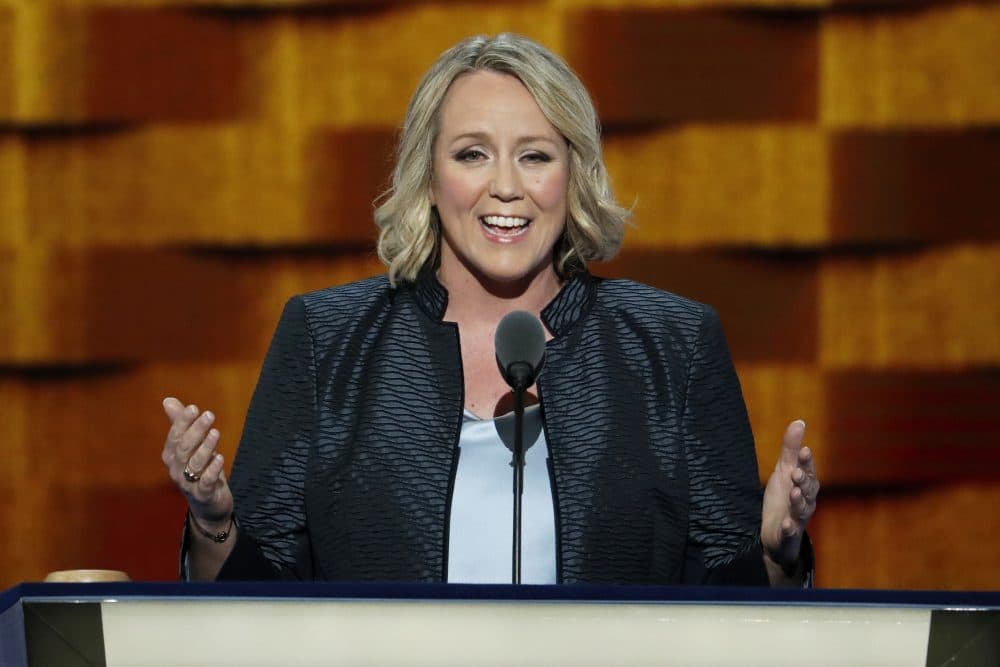Advertisement
Why Women Are Running For Office In Record Numbers
Resume
Fifty-seven percent of women voting in Tuesday's special election for Alabama's open Senate seat cast their ballot for Democrat Doug Jones. That breakdown differed greatly by race: 98 percent of black women voted for Jones, while 63 percent of white women voted for his opponent, Roy Moore.
Here & Now's Robin Young speaks with Stephanie Schriock (@Schriock1), president of the political action committee Emily's List, about the role women played in Alabama's race and the growing number of women running for office.
Interview Highlights
On disconnects Democrats face with white women voters, and with those who voted for Roy Moore or President Trump
"You have to remember that these often are women who are married to white men, who are very certain of their support for people like Roy Moore. And we cannot forget that women are living in a, I call it sort of the 'stew of misogyny.' It is everywhere in their lives, and there is great pressure to conform and be aligned with their husbands, with their families. And the first places that's starting to crumble is with the white, college-educated women. And that's where we're seeing so much growth among voters for Democrats. We at Emily's List are seeing so many college-educated women of all races raising their hand, wanting to run for office. And you mentioned those numbers earlier. In fact I should tell you today, we're over 23,000 women who want to run, and we had 66 women sign up yesterday, just yesterday, saying, 'We want to run.' This is sort of a movement, we can't expect everybody to go all at once, and it's just gonna take non-college-educated women a little bit longer, it might take a long time, because we have to break through the misogyny that has been their lives forever."
"The women who marched [in the Women's March] in January, and felt that they needed to have their voices heard, stepped outside in their communities, and then looked around and realized they weren't alone."
Stephanie Schriock
On reaching women who are single-issue voters
"Not all women are the same, and to think that 52 percent of the population think all alike is a huge mistake. And we heard those voices in Alabama where they made it clear that abortion is their No. 1 issue. There are also women in Alabama where access to abortion is their No. 1 issue. And that's OK. These elections are not, at the end of the day, about one issue for the vast majority of the population. But they are for some, and that's part of the work that we that we do. I mean our job at Emily's List is to find a winning coalition of women and good men who stand with us to elect strong, pro-choice, Democratic women, and that winning coalition starts with the leadership of African-American women. It is with Latinas and Asian-American women, and a growing percentage of white, college-educated women, and that's how I believe we see a wave of women get elected in November of 2018."
On how much the uptick in women running for office is tied to recent uproar over sexual harassment
"I believe this is all tied together. The women who marched [in the Women's March] in January, and felt that they needed to have their voices heard, stepped outside in their communities, and then looked around and realized they weren't alone. But I think that's why we're seeing the 'Me Too' movement, and even this week we saw the Democratic women in Congress step up and say that Donald Trump needs to be investigated, because we are listening to the women who are speaking out. And that is such an important cultural change for this country. And now we've gotta get it to the factory floors, and we've gotta get it to the waitresses who can't afford to speak out. We've gotta back up all those women too."
On President Trump's tweet attacking Democratic Sen. Kirsten Gillibrand
"We have continued to see this president use this coded language in so many ways, but particularly as it relates to women — whether it was Megyn Kelly early on, or Sen. Gillibrand this week, he continues to belittle and bully women. Now to be fair, he also does that with other folks. But this is very particular, and we need to call this out. This is not appropriate. We are better than this, and our president needs to change his ways, and I don't foresee that happening. But that's what needs to happen. We need to change the tone and the language we're using."
On criticism that Democrats moved too quickly to push Sen. Al Franken out of Congress
"I think we're at a place where we've gotta listen to women, and we're gonna have to have some really hard conversations about where we go from here. I don't know these answers, but I know that we're ready as a country to have this conversation, and it's time."
This article was originally published on December 13, 2017.
This segment aired on December 13, 2017.